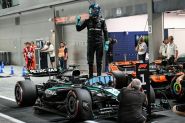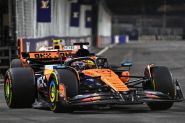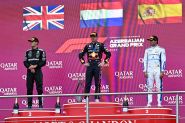
Formula 1 is often romanticized as the pinnacle of motorsport — a fusion of elite engineering, strategic brilliance, and exceptional driving skill. But behind this facade, lies a controversial, often unspoken problem: nepotism. While some people see it as a “passing of the torch” moment, others have criticized this issue, arguing that nepotism undermines the sport’s meritocracy.
If you want to become a professional biker, all you really need is a bike. If you dream of playing basketball at the highest level, all it takes to start is a ball and a hoop. And if you want to be a track athlete, two strong legs and dedication can take you far. But when it comes to becoming a Formula 1 driver, things aren’t nearly that simple. The barrier to entry is far higher — not just in terms of skill, but in money, connections, and access.
The Price of Entry
Unless you’ve been racing go-karts since childhood and have $5 to $10 million set aside, breaking into Formula 1 is an incredibly difficult path.
By definition, nepotism in Formula 1 refers to drivers gaining opportunities not solely based on merit, but because of family connections within the racing world. To put things into perspective, there are only 20 seats available in F1. Meanwhile, some drivers in F2, F3, or Le Mans may be more deserving than some of the current F1 seat holders.
Heritage vs. Hard Work
On a positive note, some of F1’s most iconic drivers have risen to the top without the help of nepotism. Ferrari’s Lewis Hamilton overcame a difficult childhood to become a seven-time world champion, while 2007 titleholder Kimi Räikkönen also grew up in modest conditions.
That said, many drivers on today’s grid do come from privileged backgrounds. McLaren’s Lando Norris is the son of a billionaire, Max Verstappen’s father Jos was a former F1 driver, and Carlos Sainz’s father is a legendary rally champion. These examples show that while nepotism can open doors, it doesn’t always prevent talent from shining through—as these drivers are clearly exceptional.
However, nepotism can also place undeserving drivers in seats that others have spent years working toward. The most notable case is Lance Stroll, often openly criticized. His father owns the Aston Martin Formula 1 team, and has consistently secured Lance a spot, despite his underwhelming performances in recent seasons.
Marketability Over Merit
Nowadays, F1’s driver selection isn’t purely based on talent - it’s also about brand value. Marketable drivers attract sponsors, grow fanbases, and boost a team’s global image. A recognizable name or media-friendly personality can be just as valuable to a team’s bottom line as lap times. This is one reason why drivers with famous surnames often receive more attention and, at times, opportunities.
For instance, how would Ferrari fans react to a random rookie from Formula 2 joining the team, compared to the feeling of seeing a driver with the last name “Schumacher” wearing red?
Formula 1’s Real Cost
Becoming an F1 driver isn’t just about talent—it’s also about funding. Working your way up through karting, Formula 4, Formula 3, and Formula 2 can cost upwards of $8–10 million. In order to get there, an aspiring driver would need a wealthy family, significant sponsorship, or close ties to the racing industry.
This financial barrier limits diversity and reinforces the cycle of privilege. Talented young drivers from modest backgrounds often drop out early, not because they lack skill, but because they can’t afford to keep racing. This is one reason why figures like Lance Stroll face criticism: despite mixed results, his place on the grid remains secure thanks to family wealth and ownership, while countless talented drivers never get the chance.
Nepotism is not always as bad as it sounds. Through your hard work, you could give an opportunity to the people you value most. And when it comes to Formula 1, it can create compelling narratives and preserve this sport’s rich heritage. However, it poses a serious threat: the alienation of deserving talents. And when a talent takes a backseat to lineage, the sport risks stalling its future.




Comments